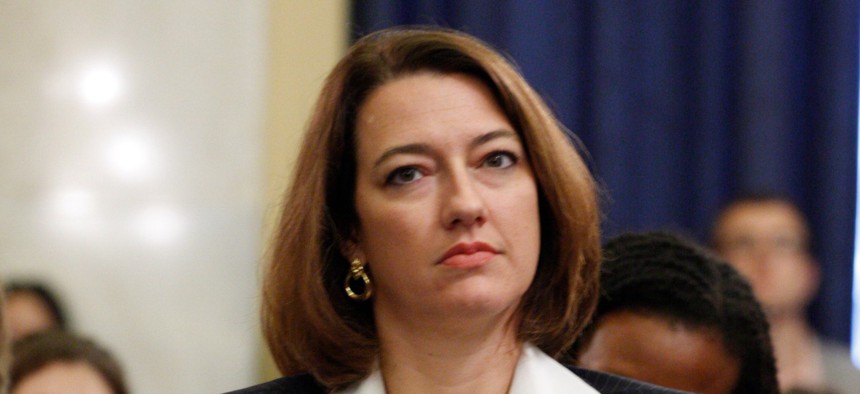The Nation’s Campaign Finance Watchdog Will Once Again Be Rendered Toothless
Without a quorum, the Federal Election Commission can’t carry out its key duties as elections near.
With four months until the November 2020 elections, the federal agency responsible for enforcing the nation’s campaign finance laws will once again lose the ability to do most of its job.
On Friday, Republican Federal Election Commission Commissioner Caroline Hunter announced she would resign effective July 3, which is exactly four months from Election Day. With the swearing in of Texas attorney Trey Trainor on June 5, the FEC regained a quorum of four after not having one for over eight months. Now, for the second time in less than a year, the FEC will be precluded from holding meetings, starting audits, creating news rules and imposing fines on those who violate campaign finance laws. Later on Friday, President Trump announced his intent to nominate Allen Dickerson, legal director at the Institute for Free Speech, to be a commissioner; however, the confirmation process could take a while.
“The FEC would benefit greatly from new faces and fresh perspectives,” Hunter wrote in her resignation letter. “It needs commissioners who will respect the First Amendment, understand the limits of the FEC’s jurisdiction, and remember that Congress established the FEC to prevent single-party control, with every significant decision requiring bipartisan approval.”
When Trainor was sworn in in late May, Democratic FEC Commissioner Ellen Weintraub told Government Executive she was ready to “roll up my sleeves and work with all my colleagues to get the important work of this agency done." She said there were 350 matters on the agency’s enforcement docket and 227 items waiting for commission action. By the time of Hunter’s departure the commission will have had a quorum, and thus, the ability to handle the backlog, for only 28 days.
Trevor Potter, president of the Campaign Legal Center and a former Republican chair of the FEC, released the following statement about what Hunter’s resignation means for the upcoming elections.
“A huge majority of voters are concerned about the enforcement of our campaign finance laws, and Hunter's resignation leaves their democratic elections with significantly less government oversight. Elections in 2016 and 2018 saw campaign finance violations including: illegal foreign spending, a lack of transparency around the sources of millions in election spending, and candidates working illegally with super PACs. Americans understand that the campaign finance system correlates directly to their families’ quality of life. The corruption of our democracy by unprecedented amounts of money in our elections from wealthy special interests diminishes the voices of average citizens. A strong and functional FEC is vital to protecting our democracy, fighting corruption and holding politicians accountable for the campaign money they receive.”
Meredith McGehee, executive director of IssueOne, a nonprofit that seeks to reduce the influence of money in politics, expressed similar worries. “It is deeply disheartening and concerning that the FEC will again be missing in action as the country enters the home stretch of the 2020 election,” she said. “The American people need a watchdog devoted to enforcing the anti-corruption laws on the books and ensuring transparency of the billions of dollars being spent to influence their votes.”
Hunter has been on the commission since 2008. Her term, along with those of commissioners Ellen Weintraub (a Democrat) and Steve Walther (an independent) all expired, but they were allowed to remain until new members were appointed to the commission that should have six members.
Hunter and Weintraub have publicly disagreed over the commission’s role in states’ expanding vote-by-mail during the novel coronavirus pandemic and the FEC’s ability to tackle the foreign interference in elections following revelations about President Trump’s Ukraine call last July that led to his impeachment in the House.
“One commissioner—who has served for more than a decade past the expiration of her term—routinely mischaracterizes disagreements among commissioners about the law as ‘dysfunction,’ rather than a natural consequence of the FEC’s unique structure, misrepresents the jurisdiction of the agency and deliberately enables outside groups to usurp the commission’s role in litigation and chill protected speech,” Hunter wrote in her letter, referring to Weintraub presumably. “The American people deserve better.”
Hunter was supposed to be FEC chairwoman for 2020, but the agency announced on June 18 the commission elected Trainor to be chair and Walther to be vice chair for the remainder of the year. Upon leaving, Hunter will be joining the legal team for Stand Together, a philanthropic organization founded by libertarian businessman Charles Koch.




